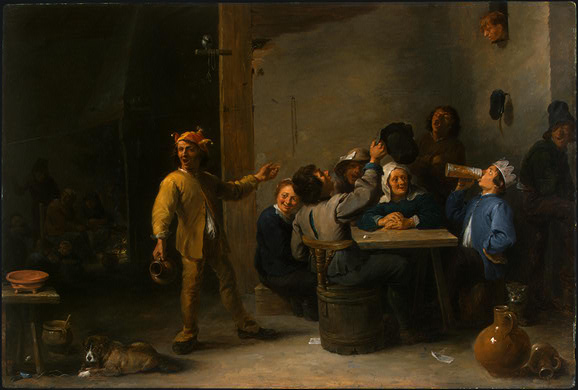My wife and I are currently in New Orleans with my mother for a few days before the semester begins. Among the things that I’ve learned here is that New Orleans celebrates Twelfth Night as well as Mardi Gras and that some people believe that the carnival season stretches from the twelve days of Christmas to Fat Tuesday, which this year is February 17. If I calculate correctly, that makes for 55 straight days of carousing.
The Twelfth Night procession that we witnessed this past Tuesday, however, looked more like the end of the current carnival season than a revving up for Mardi Gras. Although spirited, the parade was small and made me think of how Shakespeare’s play also is about winding down.
First, a note on what we witnessed, which was a merging of Twelfth Night with Joan of Arc’s birthday. There were many Joans, some riding horses, as well as monks in cowls, angelic virgins, blasphemous “flaming heretics,” a couple of jazz bands, and a death figure with his ashes bringing up the rear. In other words, the symbolism we associate with Christmas—light coming to the world in dark times—was repeated in the Joan of Arc narrative. There was nothing of Mardi Gras’ blow-out feel, however.
Shakespeare’s play also has the feel of something coming to an end. For four glorious acts, it’s a subversive play that gives voice to a host of repressed desires. I’ve written in the past about how you can find in the play “what you will” (the play’s subtitle), with men getting to imagine themselves as women (Orsino) and women as men (Viola), men getting to imagine themselves as loving other men (Orsino-Cesario, Antonio-Sebastian) and women getting to imagine themselves as loving other women (Olivia-Viola). There are also Malvolio’s class-climbing dreams.
By the end, however, the carnival has turned sour and the characters return, almost with relief, to their predefined roles. It’s as though people become nostalgic for the old order once the joyous rebellion of the late 1960s gives way to the decadence of the 1970s, when Woodstock becomes Altamont. Toby Belch’s prank turns so sour that the fool refuses to keep it going. Real violence threatens Viola as Orsino looks for a victim upon whom to vent his balked desire for Olivia, Malvolio stalks off the stage swearing revenge, and Antonio is left alone in chains. We find ourselves embracing the return to normalcy where everything seems to be familiar. The 1970s give way to the Reagan 1950s.
One sees this even in the GLBT community. After all the turmoil of the 1980s when “the band played on,” we now see many promoting…marriage and family.
Of course, after a while normalcy will invariably start feeling repressive and we will need another outlet. Viola may find herself resenting Orsino’s patriarchal imperiousness, and Sebastian may find himself longing for his carefree sea-going days with Antonio. Viola will perhaps feel the urge to cross-dress again and maybe Orsino will encourage her to do so as a way to bring back the easy camaraderie they once had. The fool will return and it will be carnival time again.
In New Orleans, I am learning, one never has to wait too long.


